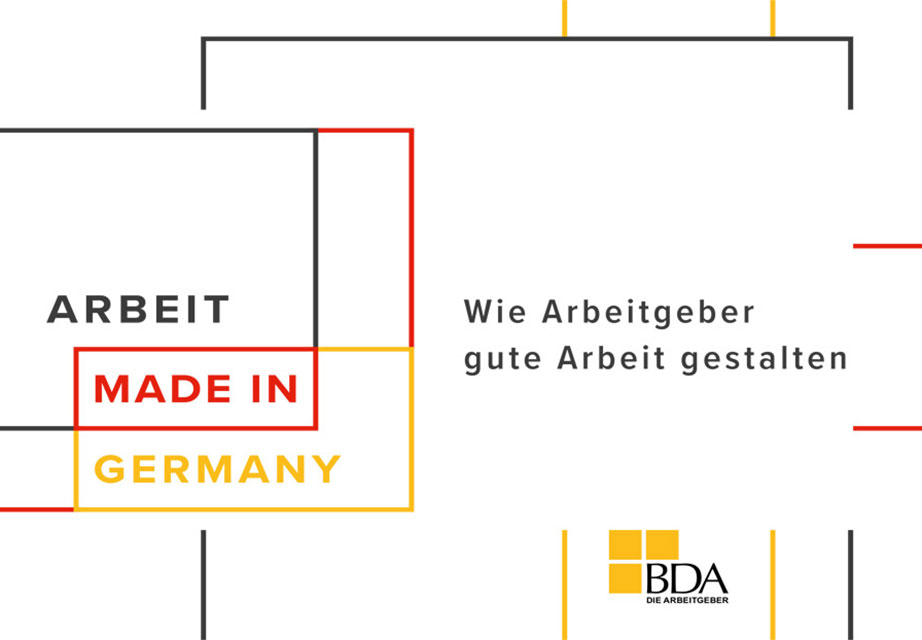Work made in Germany - How employers design good work
Working conditions and the quality of work in Germany are significantly better than some political discussions would suggest. "Made in Germany" therefore stands not only for excellent products, but also for excellent quality of work. Our social market economy works. To ensure that it stays that way, German companies are doing a great deal to ensure that work is well designed and that entrepreneurial wishes go hand in hand with the needs of employees. The high job satisfaction ratings of our employees show that this approach is successful.
Steffen Kampeter
Creating good working conditions is not just a slogan or advertising slogan for companies. They go to great lengths to make their working conditions not just good, but very good. Good work is important because it keeps companies competitive, innovative and efficient. It ensures that employees are healthy and motivated. What exactly this design looks like is shown by "Work made in Germany".
The value of work remains the same, but expectations change
Well-designed work is a key factor for health, motivation and self-esteem (Knieps & Pfaff, 2020). What makes it so unique are its characteristics: Work provides social contact and a supportive environment, structures the day and enables personal development. This value of work is the same as it was decades ago - what has changed (and still does) is the expectation of working conditions. Employees want more personal responsibility and flexibility (Raeder & Grote, 2001). At the same time, more "traditional" expectations such as job security, lifelong employment, internal promotion and specialisation persist.
It is also increasingly important for companies to be flexible and ready for change. They face the challenge of reconciling the various expectations of employees with the demands of digitalisation, change processes, sustainability, new forms of leadership, agility and flexibility - and doing so in such a way that working conditions continue to be positive for health, performance and motivation.
High job satisfaction in Germany
The companies take these challenges and the expectations of the employees seriously. Studies by the Federal Statistical Office show that employees view their work situation very positively. 89 % of the employed in Germany are at least satisfied with their job, 33 % even very satisfied (Destatis, 2018). At the same time, job satisfaction hardly differs with age (BMAS, 2018). SMEs in particular are showing a great deal of commitment to further increasing job satisfaction through employee-oriented HR management (BMAS, 2018).
Good work design as the key to job satisfaction
The basis for high satisfaction is good working conditions in companies. According to the Stress Report 2019, resources at work such as social support are at a consistently high level in terms of good cooperation or support from colleagues and the feeling of being part of the community at work. Support from managers still has potential (BAuA, 2020b, see figure).
This is what distinguishes "Work made in Germany"!
- Germany scores top marks for job satisfaction - regardless of the age of the employees.
- Working conditions are good and getting better: psychological and physical stress factors are steadily decreasing and are below the EU average, support and meaningfulness at work continue to increase.
- Work is particularly well paid in Germany. Companies also offer a great deal in the way of health promotion, diversity and the reconciliation of different areas of life, as well as protection in old age, in the event of unemployment, illness, accident or nursing care.
- Companies take the health of their employees very seriously. Health promotion and occupational safety are more successful than ever: both the number of accidents at work and the number of early retirements due to health problems have fallen by around half since 1995.
- Companies have long recognized employees' desire for more flexibility and a better balance between different areas of life and have found a wide variety of solutions.
- Changing values, demographic developments and globalisation are also driving companies' growing commitment to promoting and using diversity in the workplace.
- Digitalization is already helping to improve working conditions: Work can be performed more flexibly in terms of time and location, new technologies promote occupational safety and help ensure that as many people as possible can work until full retirement age.
- Leadership 4.0 has arrived in companies. As business models change, so do leadership and team structures.
- Companies are the largest providers of continuing education, with 85% of all companies engaging in continuing education and investing €33.5 billion for this purpose (source: IW 2017).










